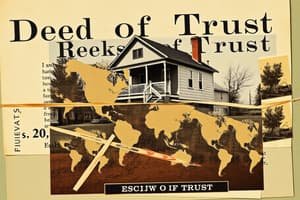Podcast
Questions and Answers
What type of payments do most first and second trust deeds require?
What type of payments do most first and second trust deeds require?
- Monthly payments (correct)
- Interest only payments
- Principal only payments
- None of the above
What is a potential issue a seller may face when taking a note and trust deed?
What is a potential issue a seller may face when taking a note and trust deed?
- Later need cash (correct)
- Die
- Have to take the property back
- None of the above
Who typically buys trust deeds?
Who typically buys trust deeds?
- Buyers
- Brokers
- Third parties (correct)
- None of the above
What is the most common starting point for the sale of a note and trust deed?
What is the most common starting point for the sale of a note and trust deed?
What identifies the process when a deed of trust is in default?
What identifies the process when a deed of trust is in default?
Which of the following involves a personal property interest in real property?
Which of the following involves a personal property interest in real property?
Who typically sells trust deeds?
Who typically sells trust deeds?
What is the start of the sale process for a note and trust deed?
What is the start of the sale process for a note and trust deed?
What should a 'request for notice' notify a person about?
What should a 'request for notice' notify a person about?
What condition is almost never true for the price of a note and trust deed?
What condition is almost never true for the price of a note and trust deed?
Study Notes
Trust Deeds and Notes
- Most trust deeds typically require monthly payments, catering to buyer affordability and structured repayment.
- Accepting a note and trust deed can pose risks for sellers, including potential future cash needs or property return requirements.
- Trust deeds represent a personal property interest in real estate, distinguishing them from other types like grant or quit claim deeds.
Market Participants
- Trust deeds are mainly purchased by third parties, including investors or financial institutions seeking returns.
- Lenders are the common sellers of trust deeds, leveraging their position in financing arrangements.
Escrow Process
- The initiation of a note and trust deed sale occurs through escrow instructions, outlining the terms and responsibilities in the transaction.
- Pricing for a note and trust deed often does not fall below the existing balance due, ensuring sellers receive fair compensation.
Title Insurance
- Queries regarding title insurance, including costs and coverage, are most efficiently addressed by title insurance officers, who specialize in this area.
Default Procedures
- The default process for a deed of trust includes multiple steps: the occurrence of default, a request for trustee action to sell, and the filing of a notice of default.
- A "request for notice" serves as an alert system concerning defaults, allowing interested parties to be informed of potential issues.
Trust Deeds and Notes
- Most trust deeds typically require monthly payments, catering to buyer affordability and structured repayment.
- Accepting a note and trust deed can pose risks for sellers, including potential future cash needs or property return requirements.
- Trust deeds represent a personal property interest in real estate, distinguishing them from other types like grant or quit claim deeds.
Market Participants
- Trust deeds are mainly purchased by third parties, including investors or financial institutions seeking returns.
- Lenders are the common sellers of trust deeds, leveraging their position in financing arrangements.
Escrow Process
- The initiation of a note and trust deed sale occurs through escrow instructions, outlining the terms and responsibilities in the transaction.
- Pricing for a note and trust deed often does not fall below the existing balance due, ensuring sellers receive fair compensation.
Title Insurance
- Queries regarding title insurance, including costs and coverage, are most efficiently addressed by title insurance officers, who specialize in this area.
Default Procedures
- The default process for a deed of trust includes multiple steps: the occurrence of default, a request for trustee action to sell, and the filing of a notice of default.
- A "request for notice" serves as an alert system concerning defaults, allowing interested parties to be informed of potential issues.
Studying That Suits You
Use AI to generate personalized quizzes and flashcards to suit your learning preferences.
Description
Test your knowledge on trust deeds and financing in real estate with this activity quiz. Questions cover essential aspects like payment types, seller risks, and types of deeds. It's a perfect way to reinforce your understanding of property interests.




